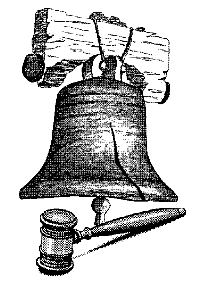Ever a controversial figure, Justice Scalia recently suggested that he wishes some talented attorneys had chosen other careers. Though his comments were probably intended only to praise the intelligence of the lawyers who argue before the Court and to highlight the complex challenges facing our society, the issue indirectly raised by his remarks is interesting to contemplate. Are legal disputes worthy of such attention by the erudite?
It is no secret that lawyers are easy scapegoats for many of society's ills. Several recent studies (e.g. this one conducted for the ABA in 2002) demonstrate that public perception of lawyers is consistently less than flattering. Surprisingly, people also generally express satisfaction with their legal representation and the abstract perception of a "career in the law" remains positive. It is not hard to see how these seeming paradoxes might arise. Though a litigant may be downright friendly with their own attorney, this relationship is likely offset by negative feelings toward opposing counsel. Throw in emotional reactions to the conflict, frustration with the many unavoidable hurdles in legal proceedings, and the often sensationalist media coverage of controversies, and it may be fair to say that, when it comes to overall popularity, the deck is stacked against legal practitioners.
Still, lawyers are absolutely essential to our society. In a nation and a cultural that prizes the rule of law, adepts in legal principles and methodology are indispensable in virtually every facet of sociocultural life. Financial transactions, government programs, non-profit organizations, and international treaties are all examples of the myriad arenas in which lawyers provide valuable services. Lawyers help to fight crime and safeguard the innocent. They help to protect the environment and maximize corporate profits. Many of our elected leaders are lawyers, and countless more weigh in on the creation of laws that help to order and regulate our daily lives. Lawyers interact with both the best and worst elements of society, and perform essential jobs that range from the most attractive to the most trying. In truth, the dislike of lawyers may arise in part from that fact that they are so essential, but hardly needs saying that this is not an appropriate justification.
Possibly because of its importance in our society, the study and practice of law is one of the most closely regulated (in fact, self-regulated) disciplines in existence. Though countless jokes refer to the greed and immorality in the legal profession, the reality is that lawyers must abide by extremely strict ethical guidelines. While these rules may sometimes be seen as flexible or unclear, this is not because lawyers ignore or the law or have a penchant for committing transgressions; rather, it is a consequence of routinely engaging exceptionally difficult 'gray areas' where a single right answer may not exist. Of course, it cannot be denied that some lawyers do fall below these ethical standards. Some lawyers do embrace greedy or immoral desires, and it is easy to see how a familiarity with the law may grant an enhanced ability to commit misdeeds. It is unfair and unwarranted, however, to extend this this 'bad apples' philosophy to all legal practitioners. The "public defender from Podunk," for example, would likely have devoted obscene amounts of time for a small amount of money to the resolution of an issue that meant nothing to her -- but everything to her indigent client. Such dedication is much more the norm in legal circles, and it deserves nothing less than glowing admiration.
A common maxim holds that "everyone hates lawyers until they need one." In our modern society and culture, lawyers are need quite frequently and serve in various important ways. The study and practice of law is a noble pursuit that is vital to the survival of a society that seeks to live together harmoniously and solve conflicts in an equitable fashion. Lawyers also engage some of the most important issues of our time, and they are often the vehicle through which important debates are conducted and resolved. Thus, while Justice Scalia makes a valid point that our complex world is certainly in need of brilliant minds and innovative thinkers to tackle a variety of diverse problems, we should all be content -- and grateful -- that may of them chose to study law.
Thursday, October 1, 2009
Subscribe to:
Post Comments (Atom)

I think you will make an excellent lawyer because you're smart and have the ability to do what is right. And you're a snazzy dresser. <3
ReplyDelete